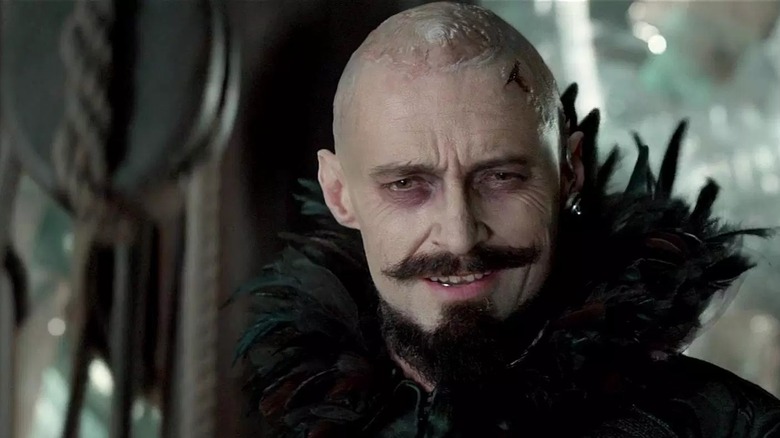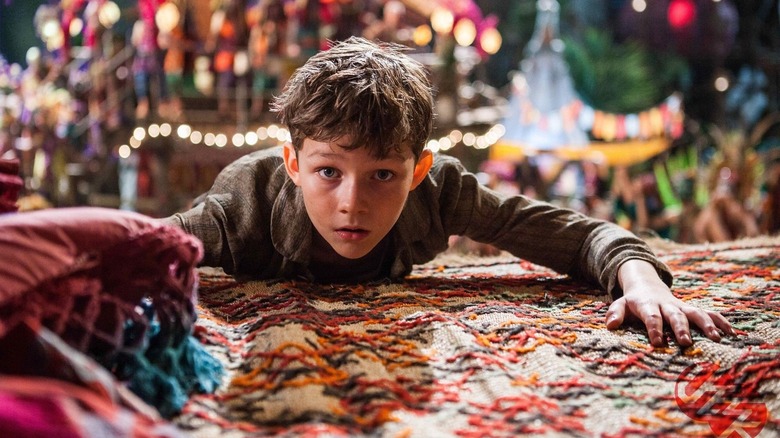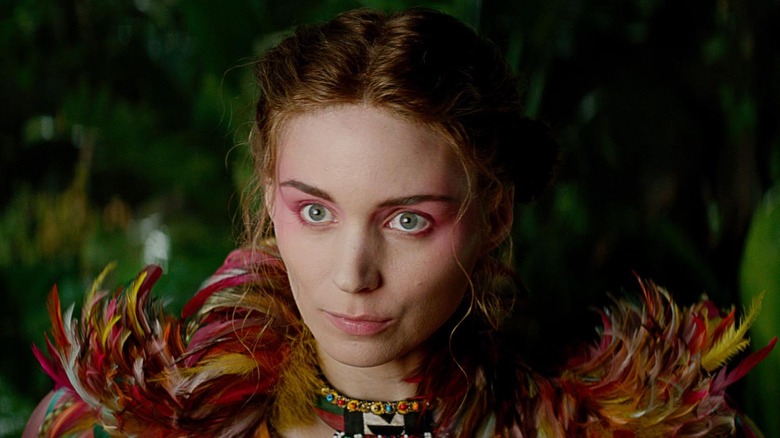Why Hugh Jackman's Pan Failed At The Box Office
Joe Wright's 2015 film, "Pan," an anachronistic and colorful origin story for Peter Pan, sounded like a good idea on paper. Reimagined origin stories were very much in vogue then throughout popular culture, and the tale of how an immortal elven boy came to Neverland only to become rivals with a one-handed pirate is certainly ripe for exploration. Also, Wright was a hot commodity, having directed a Best Picture Oscar nominee ("Atonement"), a strange action film ("Hanna"), and a high-profile literary adaptation ("Anna Karenina"). Additionally, Wright managed to secure an impressive cast that included Rooney Mara, Cara Delevigne, and Hugh Jackman as Blackbeard the Pirate. Levi Miller played Peter Pan, and Garrett Hedlund played an ally to Pan in the form of the young, sexy, two-handed James Hook, a ship's captain destined to live up to his name.
"Pan" was made for a hefty $150 million. On its opening weekend, it made a rather dinky $15 million. Worldwide, it would only earn about $128 million, which seems high, but doesn't factor in advertising and distribution costs. At last gauge, "Pan" lost about $150 million all told, making it a definitive box office bomb.
Upon watching "Pan," one will find a visually rich, energetic, and enjoyable — if predictable — adventure film. The costumes are first-rate, and the anachronisms lend a surreal edge to the story; hearing pirates sing "Smells Like Teen Spirit" is refreshingly peculiar. Wright also went well out of his way to rid J.M. Barrie's original story of racist imagery surrounding its indigenous characters. The character of Tiger Lily was now played by Mara, and the Neverland natives no longer resembled stereotypes culled from colonialist Westerns.
Peter Pan fatigue
Despite its visual sumptuousness, high energy levels, and recognizable characters, "Pan" was, well, panned. The film currently holds a mere 26% approval rating on Rotten Tomatoes, with many critics citing the film's reliance on CGI and all-too-familiar action tropes to be an issue — the climax of "Pan," for example, takes place on flying, three-masted sailing ships chasing each other through a collapsing crystal cave. There's not much humanity to such a sequence.
It also may be possible that audiences and critics simply weren't all that interested in Peter Pan as a character. Seeing as Barrie's famed immortal boy is in the public domain (the play is still under copyright, but the characters are free), Peter has appeared in many, many films over the years. The first studio feature production of "Peter Pan" was in 1924, with Betty Bronson as the title character. An animated version famously appeared in 1953, and its studio, Disney, proceeded to keep the film in heavy circulation for decades, adapting it into rides and sequels and theme park mascots. (And a much hardened version of the character, who appeared in 2022's "Chip 'n' Dale: Rescue Rangers.") In 1991, Steven Spielberg made the baffling sequel, "Hook," and P.J. Hogan made another version in 2003. The world was not hurting for Peter Pan stories.
Additionally, because of the character's association with children's entertainment — even the original play was notoriously beloved by children — any attempts to "darken" Peter Pan or make him seem cool to an adolescent audience would seem silly. There doesn't seem to be many ways to make a non-maturing child into a hip, hardcore warrior in the mold of most teen-friendly action fantasies, and one can't really include sex and violence in a "Peter Pan" story intended for a mass audience.
Origin story fatigue
Another issue with "Pan" was its adherence to a popular trend. Ever since the success of Christopher Nolan's "Batman Begins" a decade earlier, many filmmakers began to lean heavily into the "reimagined origin story" for other well-known characters. This is a trend that continues to this day. Prior to "Pan," audiences saw an effects-forward origin of the "Planet of the Apes, the "Alien" origin story, "Prometheus," an origin for Maleficent, several X-Men origins, a disastrous prequel trilogy to "Lord of the Rings," an origin story for Hannibal Lecter, for Captain Kirk, for James Bond, for Mike Wazowski. To this day, we're getting flashbacks to the early days of the Joker or Han Solo or Robin Hood. (Remember that 2018 Robin Hood movie? Me neither!).
To quote comedian Patton Oswalt, when describing the infamous "Star Wars" prequel films, "I don't give a s*** about where the stuff I love comes from! I just love the stuff I love!" Although filmmakers don't seem to have gotten the note, sometimes audiences don't need a backstory to the thing for which they are already affectionate. Where did Han Solo come from? It doesn't matter, as knowing that wouldn't make his appeal in "Star Wars" any stronger.
Knowing that Peter was a half-fairy orphan who once vanquished Blackbeard the Pirate before forming an antagonistic relationship with Captain Hook after years of friendship ... well, it's exhausting to think about. The appeal of Peter Pan is that he doesn't have to grow up, he can fly, and he perpetually lives inside his favorite adventure novel. For Peter, life is great. It's only when he meets mortals who don't share his enthusiasm for Neverland that his tragedy emerges.
"Pan" is origin story hooey. And its box office numbers attest to how well audiences responded.


